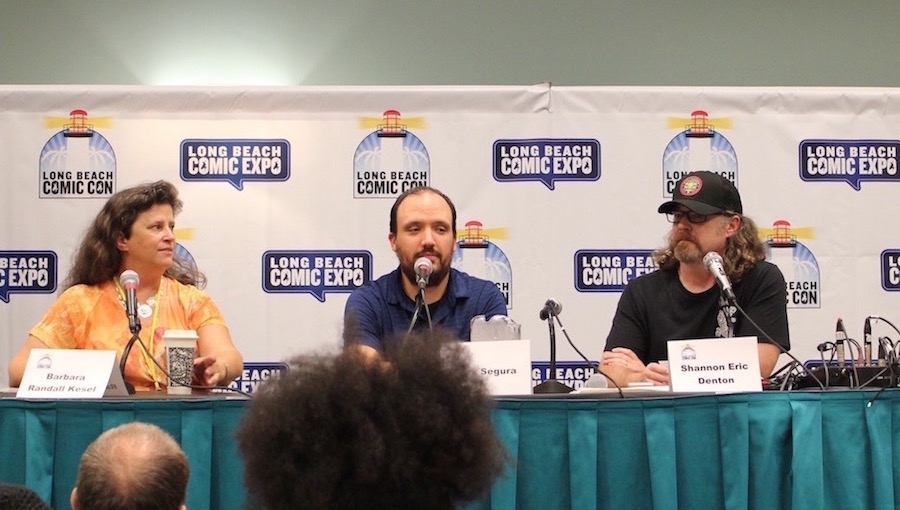“Include your contact information on every page” was immediately the first advice that editor Barbara Randall Kesel gave the audience that was in attendance for the Long Beach Comic Con panel, “Pitch, Pitch, Pitch: How to Sell Your Story” on Saturday afternoon, September 2, 2017.
After introducing writer/editor Alex Segura (the Dark Circle line) and writer/editor Shannon Eric Denton (Alan Tudyk’s Spectrum), Kesel added to check first that the publisher you want to pitch to is even accepting pitch packets. Segura agreed and said that it was critical to have clarity throughout the packet. He then took a step back and suggested picking up an issue of PREVIEWS to first identify publishers of interest, and then determine the editor(s) you want to contact. Denton related the importance of knowing the projects out there currently, because it would be terrible to pitch a project already being done.
Once the editor has been identified, Segura states to reach out to that person first before sending your packet. All three panelists advised against unsolicited packets. If you are new to the industry that you want to break into, Kesel conveyed the importance of creating an example product. Segura said to start with your own ideas, because it is easier to sell. Kesel added to come up with one idea and take the time to develop it. You don’t have to create the entire project (all of the issues), but you should produce the first few pages. Denton agreed, because the editor will be looking at your ability to bring content together.
Anticipating that the audience had questions, Kesel grabbed a wireless microphone and started walking around the room taking questions.
Question: Should I get an agent?
Answer: No, not when first starting out in comics.
Q: Are conventions good pitch opportunities?
A: Segura said he prefers setting up an appointment with the editor. Kesel said not to expect the editor to read your pitch on the spot. She revealed that for many editors in the industry, reading pitches are often read during their off-hours. Denton agreed and added that cons are, however, good for making initial contact with an editor.
Q: Any advice if your comics is optioned?
A: Denton said to decide what you’ll accept to be changed in your comics when it is adapted to film. Otherwise, don’t sign. Segura advised getting legal advice before signing a contract. Once you do sign a contract, you need to let your project go. With optioning deals, Denton added that the bigger the deal, the more people that will be involved.
Q: For your first work-for-hire job, do you try to negotiate for a better deal?
A: Kesel said to take what is offered. Looking beyond the first job, you are really trying to establish your name. Once you have established yourself, then you can negotiate. Segura concurred; develop your brand. Denton also agreed that you should take the job because it is way to get in. He said it gets easier to communicate with colleagues once you are in.
Q: Are there resources available to help a person with their pitch?
A: Segura said he has a two-week class that can help people learn how to sell their pitch. Denton suggested checking out writer Fred Van Lente’s webpage on how to format comic scripts. The panelists segued into the need for an elevator pitch, that quick pitch of a couple of sentences in which you can succinctly describe your project. Kesel said an elevator pitch is crucial. Denton said that the person you are pitching to is not a writer and often a representative to the decision-maker; hence the pitch has to be memorable and, of course, concise so if someone else reads it, they will “get” the pitch.
Q: What is a mistake that each panelist has made or advised the audience not do?
A: Kesel said she initially avoided social media and, as a result, her lack of an online presence hurt her. She added three tips about using social media: (1) don’t complain; (2) don’t air your feuds with others; and (3) don’t lie to your editors – they can easily check up on your Facebook, Twitter, Instagram, etc. Denton said it was important to know when to ask for help. Communicate if you are having troubles making a deadline, for example. Segura agreed: “Don’t go ghost.”
Q: Does a project need a tag line?
A: Segura said yes, because it could be an excellent hook. Denton said it doesn’t replace the plot, though – you still need to follow up with a paragraph explaining the project. “You still have to connect the dots” of the story for the editor, he said. Kesel stressed do not withhold the ending from the editor.
Q: If you are a writer with a pitch, how integral is the art?
A: Kesel said to be clear in your pitch if the artist is the co-creator, co-owner, or work-for-hire. Regardless of the artist’s role on the project, treat them as a professional. Denton added that the reason it is important to make the distinction of the artist’s role in pitch is because the editor may want to have a different artist on the project.
As the hour came to end, Segura and Denton said that it comes down to the question, “How badly do you want to succeed?” They said they are where they are today, because they put aside other activities to work towards their goals.
Panel photograph courtesy of Michele Brittany

